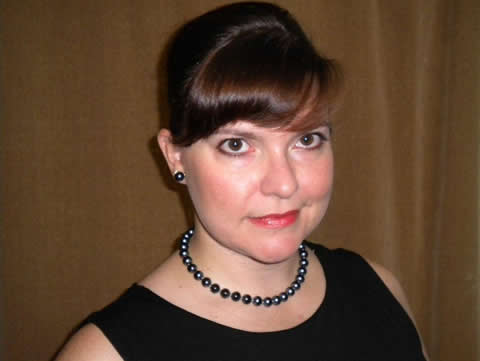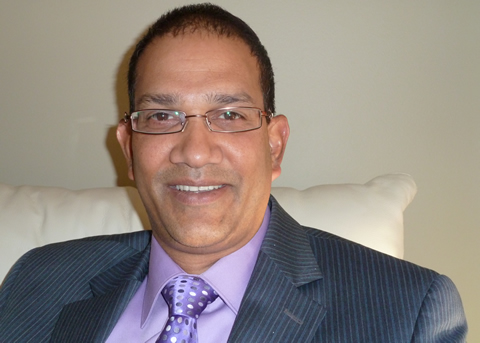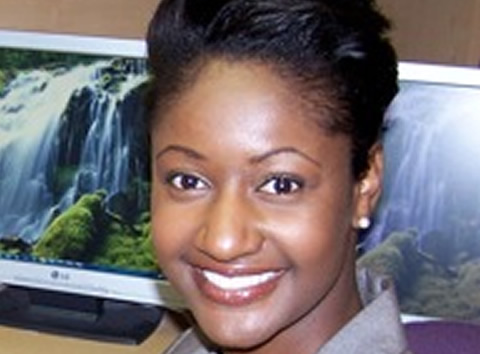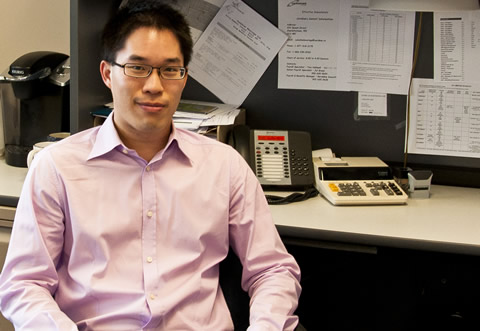We spoke to four grads with an interesting perspective on career-building to share their thoughts on what new grads should consider when looking for work.
Christopher Law
Bachelor of Business Administration 2008 UTSC; Master of Industrial Relations and Human Resources, 2009
Current Job: HR Business Partner, Canadian Bearings Ltd
What mistakes do new grads often make in their job search?
New grads commonly forget how important networking is. No matter what kind of job you’re seeking, it’s always good to know people in the field. Students should get involved in their chosen industry, perhaps through the local chapter of an industry association. Be visible, go to events and get yourself noticed. People will know that you’re new, but if you keep attending events, they will know that you’re interested. This will be a huge help when you graduate. Another tip: Don’t pressure people when you’re looking for a job. You’ll come across as pushy – or desperate.
What aspects of your education have served you best in your career so far?
My undergrad in business really instilled in me how to be assertive, the importance of networking, how to critique my resumé and how to tailor my cover letter when applying for jobs. When I talk to a lot of people who didn’t come from a business background, they don’t have those skills, and you really need them. Whether you’re in business or science, every student that graduates from university should have a prep course on how to create a resumé and critique it. A lot of people in the sciences are very uncomfortable doing interviews and I’m pretty comfortable because from year one all the way to year four, I’ve had that practice. It’s just like any skill, if you haven’t had a lot of practice, you’re going to feel uncomfortable and the interviewer will see that. Having that as a prep course gave me a big advantage.
What did you find most challenging about the transition from university to the working world?
I miss the sense of community. It’s a continuing challenge. I really miss that part of school where you can commiserate and reflect on the same problems. Also being in HR, I can’t really get close to particular employees.
What is the most interesting part of your current job?
Employee relations. Every time the phone rings or I get an email from an employee, I have no idea what the issue or problem will be. It’s scary, but exciting at the same time. I like the variety of my job. There’s no cookie-cutter way to approach these problems. You always have to look at each one as its own case: ‘What would I recommend to this manager, what are the next steps to take.’ It’s very challenging, but also very rewarding.
What do you miss most about your time at university?
I miss learning. At work, you learn something new, but nothing as interesting or mind-blowing as what you learn at university. Also, I miss having a flexible schedule and sleeping in.
Do you think having a U of T degree made any difference when you were in the job market?
One of the reasons I chose to attend U of T was its reputation. It’s very well known. Having that U of T reputation behind me made a difference. It gave me confidence.
What extra value do you think you got out of a master’s degree?
I learned how to network with people better. During my master’s, I received many opportunities to network with industry professionals. These came through group-work with my peers, many of whom were already working full-time in the industry. We also had informal pub nights and other events throughout the year to allow us to explore various career options and discuss them in a casual setting with industry professionals. I learned how to properly approach a stranger at a conference and strike up an intelligent conversation and to be comfortable and confident doing that.
Speaking with your HR hat on, what advice would you give to students considering a master’s degree?
I would strongly recommend working for a few years before considering a master’s degree because you will appreciate what you are learning so much more after you have worked. I say this because I did my master’s right after my undergraduate degree and honestly at that point I was a little tired of school and I just wanted to complete my degree and start working. I believe if I had gone back after a few years of work I would have been more excited and motivated to be doing my master’s. Also, with a few years of work experience, you can contribute more in class discussions. Many students right out of undergraduate have only theories from their textbooks to rely on to defend their argument or position. The working world will give you a better understanding of what is realistic and what is idealistic as it pertains to your field. Also, when you are working and taking classes part-time you can choose courses that can help you in your current job. You can apply what you learn from class immediately. Of course, there are advantages to taking your master’s straight out of undergraduate: you complete your degree much faster (in one year versus four years). And if you know you’re the type who isn’t likely to go back to school once you are done, then maybe you should just go ahead and continue school while you are still motivated.

Susan Rowley
Emerging Leader’s Program, Initiative for Women at the Rotman School of Management
Current Job: Manager of Talent Development at Loyalty One
What mistakes do new grads often make in their job search?
When new grads look at job postings, they sometimes think that the description captures everything about the job. Some might even turn down an interview because they don’t see the job’s possibilities. What I’ve learned is that what you see on paper is not all you’ll be doing. The possibilities are endless, but sometimes you have to make your own. A particular job may not sound like the right one, but you could make connections there or learn something that you won’t learn anywhere else.
What aspects of your education have served you best in your career so far?
The related abilities to build relationships and earn people’s trust are both very important. I am constantly working with people from different backgrounds and educational levels, and they need to be able to trust my advice to them. I learned in university how to build that trust.
What did you find most challenging about the transition from university to the working world?
Academia is very different from the job world. I’m fortunate because I have a foot in each. So part of what I do is try to understand what classes, degrees and certifications employees need for their careers. Because work is constantly changing, I have to keep updating my understanding of the working world. I’m not at IT person, for example, but I need to have an understanding of IT. I might need to take some courses that are IT-specific so that I have an impression of what an IT person does, and know how to speak their language.
It wasn’t until I’d been laid off that I really reflected on what I value, what skills I bring to the table and what actually interests me. When I was able to figure out those three things I was able to say, ‘OK, this is what I want to be and this is what I want to do’. So it’s not about money, it’s not about the title. The average person spends 2,000 hours a year at work. So it should be something you love.
Is there any part of your education life that’s stayed with you?
I ask a lot of questions, all the time. It’s not because I don’t understand, but because I like learning the reasoning behind the ‘why.’
What value do you think you got out of your U of T program?
I attended the Rotman School of Management in 2009 where I participated in the Initiative for Women in Business as part of the Emerging Leaders Program. This provided a great opportunity to meet other women who were going through the same thing. Two years later, we still have a network. We see each other, usually once a quarter, and discuss ideas and opportunities. We also maintain contact with our professor.
What advice would you give students considering the leader’s program at Rotman?
The people – your classmates – are fantastic. I learned from listening to each of them. You can learn just as much from them as the professors and speakers.

Glen Matadeen
Master of Education, University of Toronto 2005
Current Job: Employment Coach, U of T Career Centre
What mistakes do new grads often make in their job search?
Many grads today have been raised by parents who went to school at a time when the process was ‘you go to a school, you get a good education and you get a good job.’ But over the past 10 years, life has changed tremendously in the way organizations recruit, how they select, and how positions are filled. Many people still believe that if you have a degree you’ll get a job, and that once you earn a degree you’ll know what to do because your degree defines you. But this isn’t the case. What many students don’t realize is that volunteer work is an acceptable form of experience. There are ways outside of academics to demonstrate that you have the skills, knowledge and experience relevant to a particular position. Being unclear about exactly the kind of job you want in today’s world is a real challenge. Most companies will want to know what position you want and what you will do for them in that position.
What aspects of your education do you reflect on the most and what has served you the best in your career so far?
There are three things. First, at OISE, the way you learn is very collegial and includes people from many different backgrounds and cultures. This made for a dynamic setup. Your fellow learners are people in HR, or doctors or lawyers, and this meant you learned from your colleagues as well as the professors.
Secondly, people were open to new ideas; there were no limitations.
Third, U of T has high-quality professors – people who are at the top of their field. Having that sort of knowledge base is very grounding. Even the visiting professors are top of the line. U of T attracts some of the best and brightest in the world. Being in a classroom with people from different countries and having different experiences, you can’t help but learn new things. U of T challenged me to be open to new ideas.
What did you find most challenging about the transition from university to the working world?
I had to expand my network. But this requires effort and involves risk-taking. You suddenly have to meet a lot of people and it can be intimidating. One thing I learned is that you have to make two lists, a B list and an A list – and you sort of practice on the B list first to gain confidence. You realize if you mess up, it’s not a big crisis and that gives you confidence to move forward.
What is the most interesting aspect of your current job?
I meet people from over 150 different countries studying from a selection of 841 different undergraduate programs, 520 graduate programs, and 42 professional programs. I learn something from every single one of them. Every day I come to work and I meet someone from Jordan or Brazil or Vietnam. It’s like living in an intellectual – and very peaceful – microcosm of the whole planet.
 Lauren Canzius
Lauren Canzius
Honors Bachelor of Arts in Political Science & Employment Relations, 2006
Current Job: Employee and Labour Relations Consultant, City of Toronto
What mistakes do new grads often make in their job search?
I’d say being too narrow. You really have to understand your combination of skills and experience coming out of university. You may have computer skills, but if you have been too narrow with your experiences, it may be to your detriment. As a new grad, your first step should be to get employment experience anywhere you can. Just keep an open mind, even if it’s an internship or volunteering.
What aspects of your education have served you best in your career so far?
The ability to manage my time effectively and prioritize my tasks at work. My writing skills as well. At university, every day of the week there’s a paper due.
What did you find most challenging about the transition from university to the working world?
Getting used to your organization. Working in a university and working in an office are two very different things. You need to understand the organization you’re in, the context you’re in, and the players involved since they all can prove challenging.
What is the most interesting part of your current job?
The fact that every single day is absolutely different and that I never know what it’ll be like.
What do you miss most about your time at university?
I really got into the spirit of things when I was there. I went to U of T with one of my really good friends – whose mom attended U of T with my mom. It was a great way to experience university life.
How did you find the job hunt after leaving U of T?
I started grad school right after U of T, so my job hunt didn’t start until after that. I was definitely trying to put out lots and lots of applications, and fortunately I got an internship.
How long have you been in your current position?
Two years.
You went to U of T and Queen’s. Is there anything specific from each place that you’ve taken with you?
From U of T you take along that competitive spirit, because U of T is a competitive school. And from Queen’s, by the nature of the program, you stay in touch with your cohorts.





